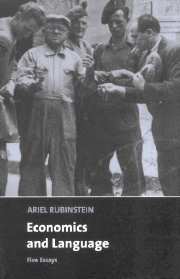Johan van Benthem
Published online by Cambridge University Press: 22 September 2009
Summary
The ubiquity of language
Language is the air that we breathe when thinking and communicating, often without noticing. It makes human cognition possible, and at the same time constrains it, in often invisible, but very real ways. Philosophy took a “linguistic turn” in this century, when this crucial medium became a focus of attention, out in the open, especially in the analytical tradition. The result were new insights into the structure and functioning of language, which have gone into modern logic and linguistics, often under the heading of “semantics.” Ariel Rubinstein makes such a linguistic turn as an economist. He investigates “the economics of language” – i.e. optimization mechanisms that make language work, both as a structure and as an activity, but also “the language of economics,” linguistic mechanisms underlying economic behavior and our theorizing about it. More generally, his book is an attempt to position Game Theory in a broad intellectual landscape of reasoning and communication: which I find very congenial. Indeed, the author writes about Paul Grice's views in “Logic and Conversation”: “[this] is essentially a description of one agent thinking about how another is thinking. This is precisely the definition of strategic reasoning and is the essence of game theory.” I found that quote interesting as a logician, because the analysis of many-agent communication is also a central topic on the modern agenda of logic, computer science, and cognitive science. Are we all in the same boat? Let's compare Rubinstein's agenda with that of people like me.
- Type
- Chapter
- Information
- Economics and LanguageFive Essays, pp. 93 - 107Publisher: Cambridge University PressPrint publication year: 2000
- 5
- Cited by



